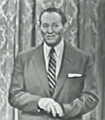Confessions of an Art Linkletter Kid

Art Linkletter died two years ago, but I still sometimes think about the long black limousine that appeared outside my Los Angeles elementary school one morning during the spring of 1967. In stepped five children, including me, on our way to the set of Linkletter’s famous House Party program, where we would become the latest of Art’s kids — you know, the ones who said the darndest things. My mom had prepared me for the world of color TV by making me wear a pair of orange socks.
The chauffeur dropped us off beneath the unblinking CBS logo. A horsey, big-jawed woman, Dorothea Fitzgerald, came out to meet us. She had worked for Mr. Linkletter since 1950 and had already guided 12,000 kids onto the show.
Miss Fitzgerald went over the questions that Mr. Linkletter was going to ask us. First, she said, what’s your favorite food?
“Spaghetti, “I said when my turn came, “with meatballs.” Miss Fitzgerald’s eyes grew dull. “Isn’t there an unusual dish that your mother makes — a family specialty?” she asked. I knew there had to be a right answer. “Dolmades,” I said, explaining that this was a Greek food my Mom had learned from my grandmother. Miss Fitzgerald flashed her mare’s smile and jotted a note on a card.
Then came the next question. If I could have any two people in the world as parents, who would they be? I mentioned Elizabeth Taylor and Dick Van Dyke, although I couldn’t think of a single reason why. “How about if you say this,” Miss Fitzgerald told me. “’I want Elizabeth Taylor so I can have a Wow for a mom, and I want Dick Van Dyke so I can have a Zoom for a dad.’” What did that mean, I wondered, and was she allowed to invent answers for me? She waited for my reply. Did she want my truthful answer or a response that pleased her? I knew, and I nodded.
At that moment Mr. Linkletter walked into the room. He was tall and thickly built, and he wore a blue suit. Makeup caked the lines of his face and gave it the tint of a baked potato’s skin. The face powder made his teeth appear china white, and his scalp glistened under a comb-over. He looked ancient.
Linkletter was then 54 years old. “Hello there, kids,” he told us, all business. “Ready to go?” We said nothing. Of course we were not ready. “We’ll have a lot of fun out there,” he said with a clap of his hands. Then he was gone.
Much too soon, we were marched before the audience and into our chairs on the House Party set. The cameras were not yet rolling. Mr. Linkletter stood before the impenetrable blackness of the audience, haloed in light and his suit blazing an electric blue. “Hello, orange socks,” he said.
Everything unfolded in fast-motion. Two men wearing headsets glided their cameras into position like water bugs. Music chimes playing a nursery school tune sounded from nowhere. And then Mr. Linkletter was at my side, introducing me to America.
A couple of months later, when this taped program finally appeared on television, my father used a silent Super-8 camera to film the show off the screen. It shows my House Party appearance in an eerie and flickering pantomime.
There I am, sitting on a stool with my hands in my lap and my black glasses clamped onto my face. Mr. Linkletter has his hand on my knee. My face fills the screen in a close-up. What a clear and bright face it is, unmarked by disappointments. I answer his question, nodding my head for emphasis. The view shifts back to Mr. Linkletter, who raises his eyebrows and looks at me with what appears to be fondness and admiration. He tugs at his microphone cable and moves along to the girl on the stool next to mine.
Soon Mr. Linkletter returns to me. His hand is back on my knee. I speak, he takes a big step backward, and he’s all smiles. He gives me a chuck under the chin. There the film ends.
We never got around to discussing Elizabeth Taylor and Dick Van Dyke. When Miss Fitzgerald carried onto the stage one of our prizes, a telescope, Mr. Linkletter had the last word: “You can use this to spy on the neighbors.”
Thus arose my connection with Linkletter, which lasted well past the cancellation of House Party three years later. I often thought about his smile, his “orange socks” quip, and the answers his assistant coached me to give. Art and I shared something bright and something that felt strange. Our relationship had complications.